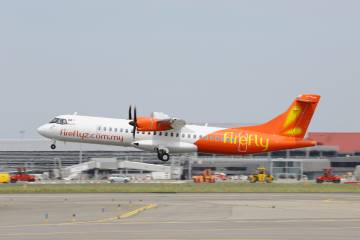Malaysia is revisiting plans to become a dominant force in the region’s aerospace and business aviation segments with the transformation of the capital’s former international gateway, Sultan Abdul Aziz Shah Airport, commonly referred to as Subang Airport.
Speaking to journalists on Monday, Transport Minister Anthony Loke said the proposed Subang Airport Regeneration Plan would “rejuvenate Subang Airport as a city airport” and serve as a secondary hub complimenting Kuala Lumpur International Airport (KLIA) while positioning itself as a business jet gateway. Plans call for it to become a central player in Asia Pacific’s multi-billion-dollar aircraft maintenance and manufacturing industries.
“My target for Subang Airport is to become an aerospace industry center for the region, not only as an airport but also a hub for maintenance, repair, and overhaul (MRO),” Loke said. “KLIA will remain our most important gateway of the country, but Subang will be a city airport, modeled after many other cities in the world such as London.”
According to Loke, Subang Airport, which operates under the management and oversight of Malaysia Airports Holdings (MAHB), will undergo development across seven key domains: an aerospace industry center, an MRO center, a research and development center, general aviation operations, business aviation operations, urban air mobility, and regional commercial flight operations.
Over the next two months, MAHB will further develop and submit its business plan—which received in-principal approval from Malaysia’s Cabinet last week. It will reveal the total cost of the project once it finalizes its proposal. Whether MAHB’s current restructuring scheme is a revamp of its comprehensive $302 million strategic long-term development plan submitted in 2021 remains unclear.
Situated some 30 minutes from Kuala Lumpur’s city center, Subang Airport opened in 1965 as Malaysia’s key international gateway before KLIA supplanted it in 1998. The airport sees commercial turboprop service on mainly domestic routes and serves as a base for three domestic carriers—Lion Air affiliate Batik Air, Malaysia Airlines’ budget carrier Firefly, and regional airline SKS Airways. Local cargo carrier Raya Airways also maintains a base there.
The regeneration plan will see the return of Airbus A320– and Boeing 737 family aircraft while airport capacity will expand to 8 million passengers per year. According to MAHB’s managing director Iskandar Mizal Mahmood, Subang Airport will also accept traffic overflow.
“Seventy percent of the traffic at KLIA is narrowbody,” he explained. “If we plan it very smartly with the government of Malaysia, we can alleviate some of the narrowbody aircraft point-to-point at Kuala International Airport by bringing them [to Subang]…leaving more space for long-haul flights using widebody [jets].”
While authorities have floated the idea of turning Subang into an international aerospace hub since 2005, the airport is home to several local and global players offering MRO facilities and general aviation services. In 2020, MRO activities contributed to roughly 50 percent of Malaysia’s aerospace revenue.
Last September, Collins Aerospace broke ground, starting construction on a 160,000-sq-ft MRO facility in Subang Aerotech Park with an investment of over $3.7 million to service air cycle machines, heat exchangers, propellers, and actuation systems as well as research and development activities.
By year-end, Dassault Aviation subsidiary ExecuJet MRO Services will relocate from its current Subang center to a 149,500-sq-ft facility capable of accommodating a mixed fleet of up to 15 business jets daily, including the ultra-long-range Dassault Falcon 10X, due to enter service in 2025.
Danish company Skyway Technics—which entered Subang in 2014—will also expand capabilities with a line and base maintenance hangar, component repair workshops, a parts distribution center, and AOG support.
Meanwhile, SkyPark Aviation Group serves as Subang’s main FBO, supporting business and other general aviation activities since 2008.


